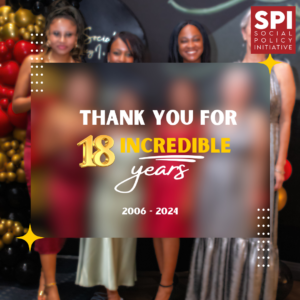Mpho Mhlongo presents a discussion about the current Social Security System in South Africa
Studies in Poverty and Inequality Institute’s Mpho Mhlongo joins Are We Transforming to discuss her views on social security issues and how they should be viewed. Mpho has graduated with a BA(Law)(Wits); LLB(Wits) and is the Company Secretary Intern at SPII & Lobbyist
Social assistance is by far, one of the most effective pro-poor programmes that has and continues to keep even more vulnerable South Africans from falling deeper into poverty, some of the existing grants include the Older persons, War Veteran’s Grant, Grants In Aid, Disability Grant, Child Support Grant, Care Dependency Grant, Foster Child Grant, and Social Relief in Distress grant.
There is widespread consensus that grants have contributed to a reduction in poverty.
Despite this, a huge gap existing gap exists within the system in relation to coverage of unemployed able-bodied adults aged between the ages of 18-59.
To qualify for the SRD, the following criteria needs to be met:
- Currently residing within the borders of the Republic of South Africa;
- Above the age of 18 and below the age of 60;
- Unemployed;
- Not receiving any social grant in respect of himself or herself;
- Not receiving an unemployment insurance benefit and does not qualify to receive an unemployment insurance benefit;
- Not receiving a stipend from the National Student Financial Aid Scheme (NSFAS) and other financial aid;
- Not receiving any other government COVID-19 response support;
- and Not a resident in a government funded or subsidised institution.
This creates an opportunity for us to bring in a Basic income grant as a means of poverty reduction and fighting inequality, it is not a silver bullet solution to all problems, It is a periodic cash transfer that is unconditional and permanent, and paid to all individuals in society.
A BIG is described as being paid at regular intervals (for example every month), not as a once-off grant. It is paid in an appropriate medium of exchange, allowing those who receive it to decide what they spend it on. It is paid to all, without means test and It is paid on an individual basis
A BIG consisting of R1268 is based on the upper bound poverty line, and affordable through a blend of financing. The poverty lines are indicated as; Food poverty Line (R585) Lower-bound poverty line (R840) Upperbound poverty line (R1 268).
IT IS TIME THE SOUTH AFRICAN GOVERNMENT SHOWED BOLD LEADERSHIP AND TAKE SERIOUSLY CIVIL SOCIETY’S CALLS FOR THE IMMEDIATE IMPLEMENTATION OF A BIG IN SOUTH AFRICA
For the full presentation, click here: Social Cash Transfers in South Africa (1)
Source: Are we Transforming?










